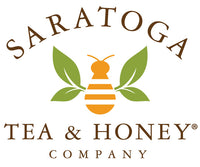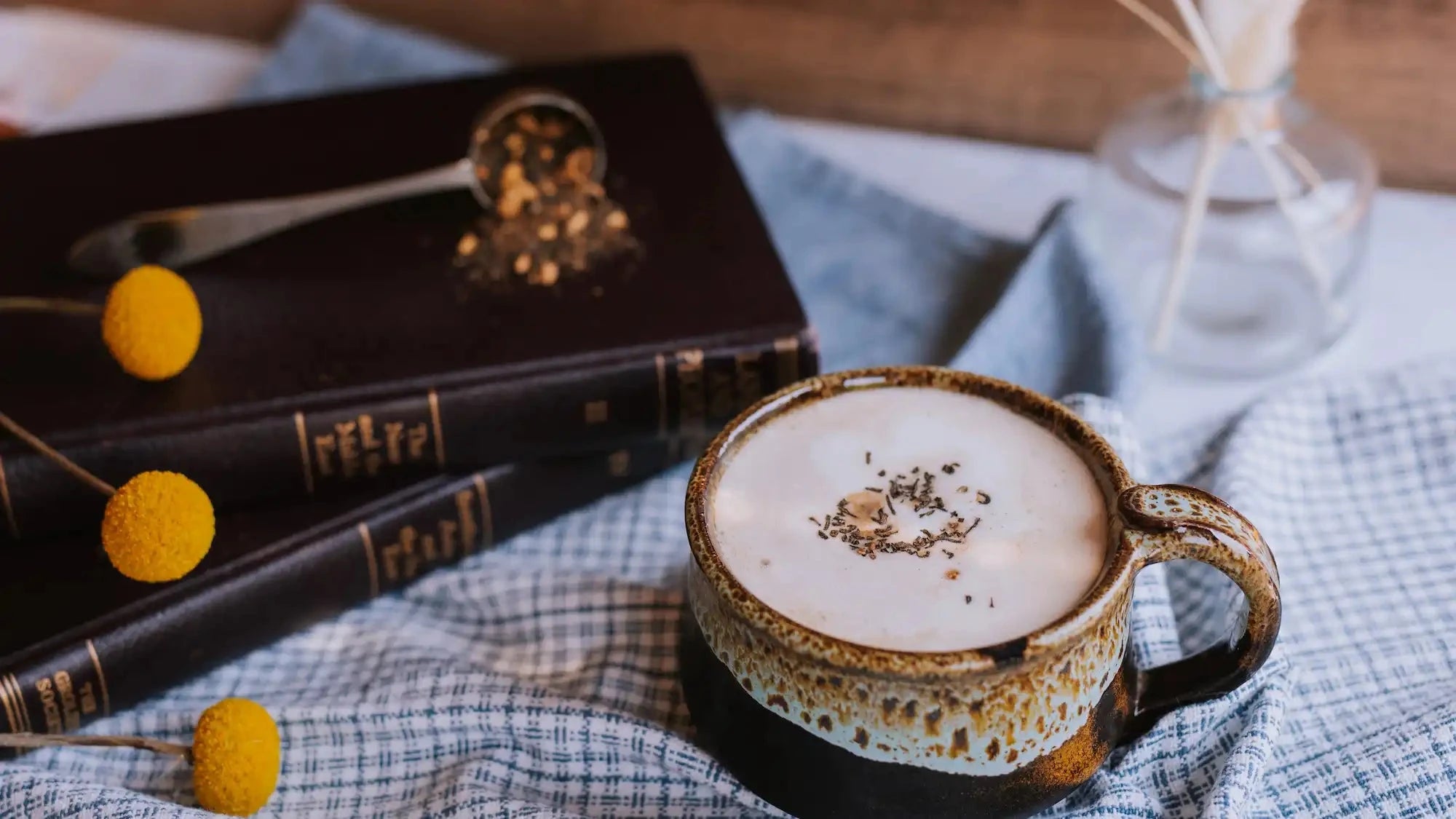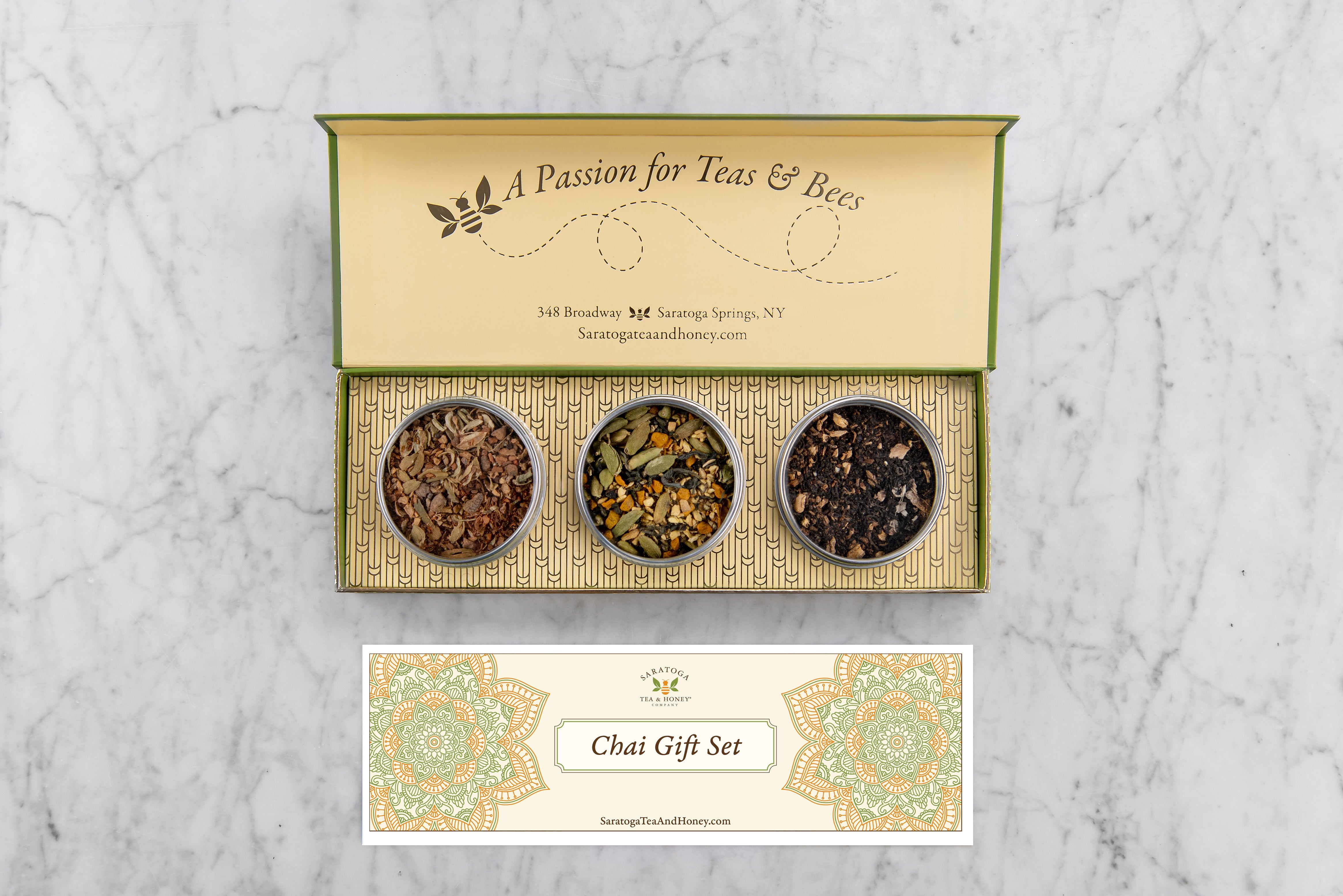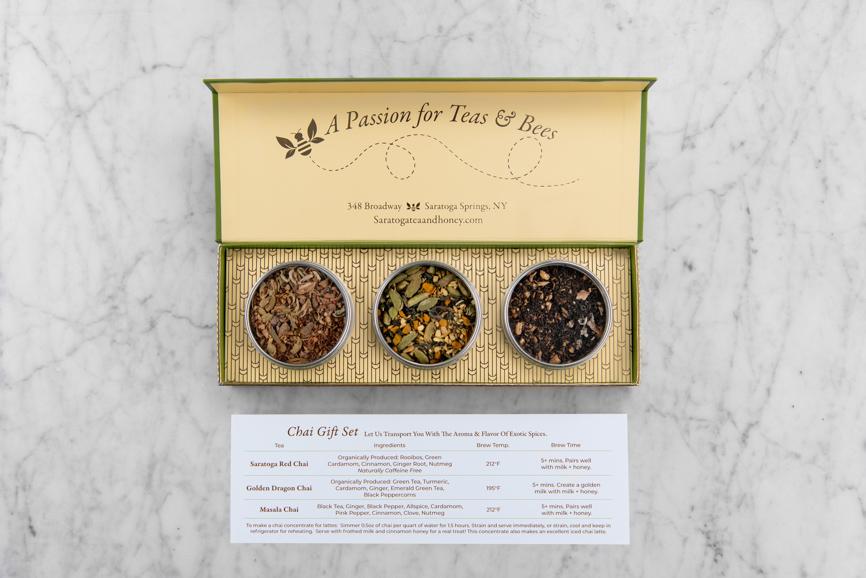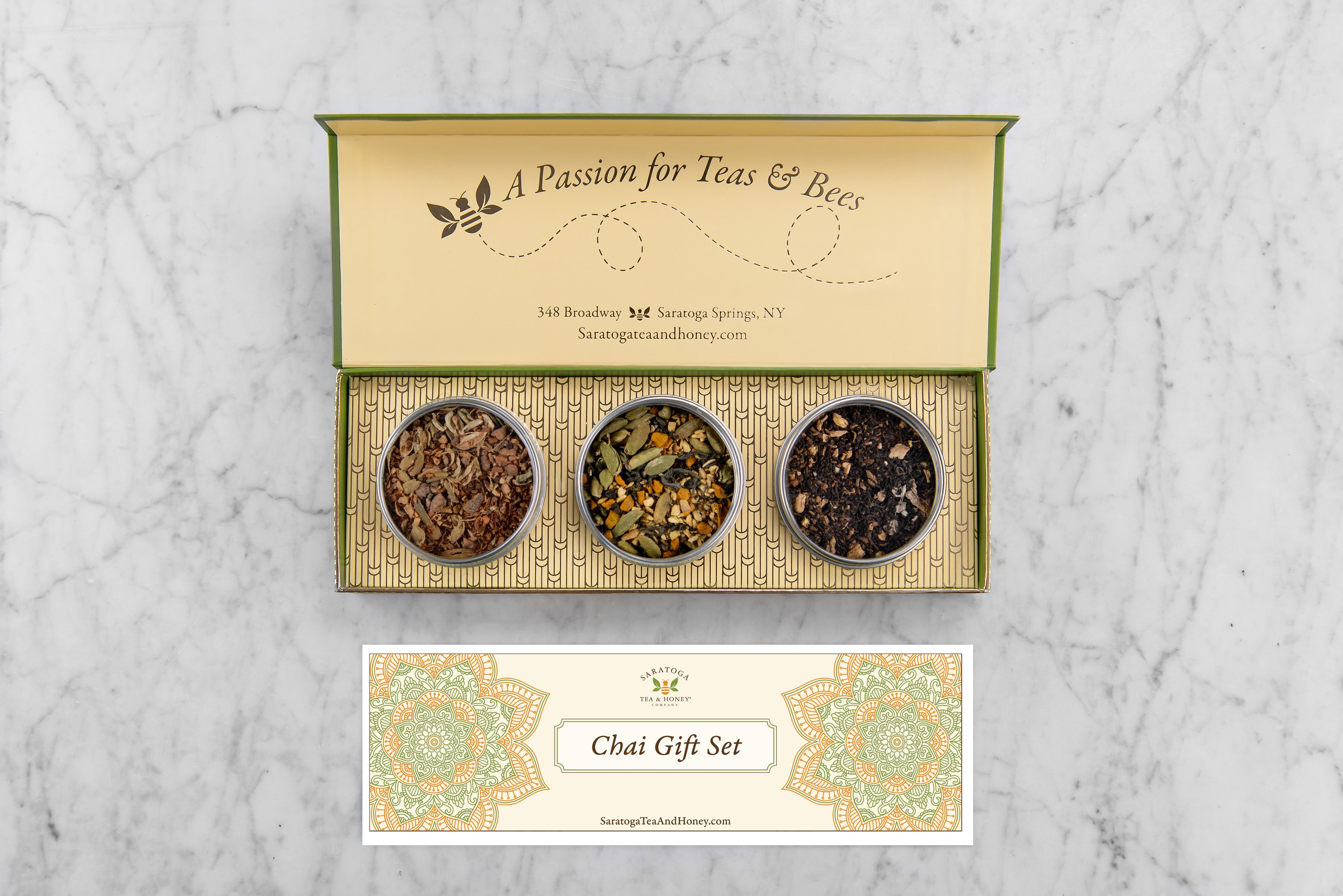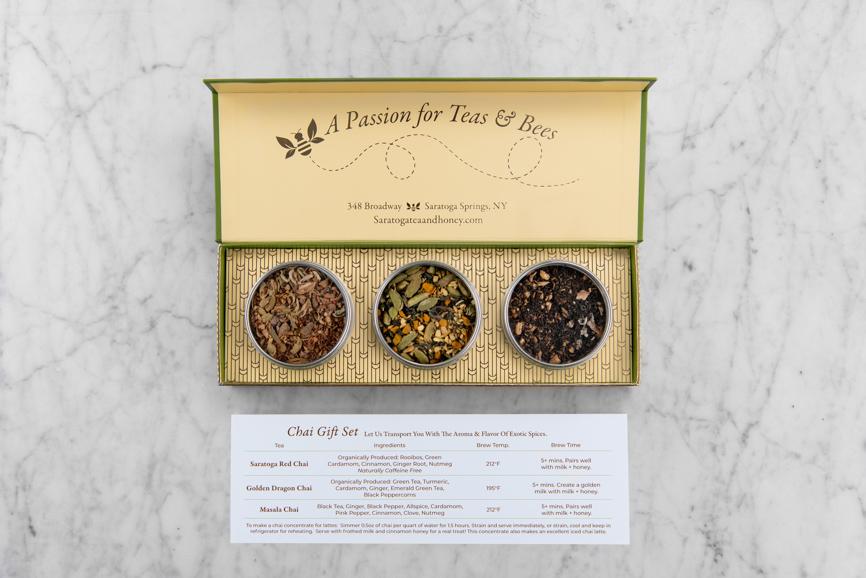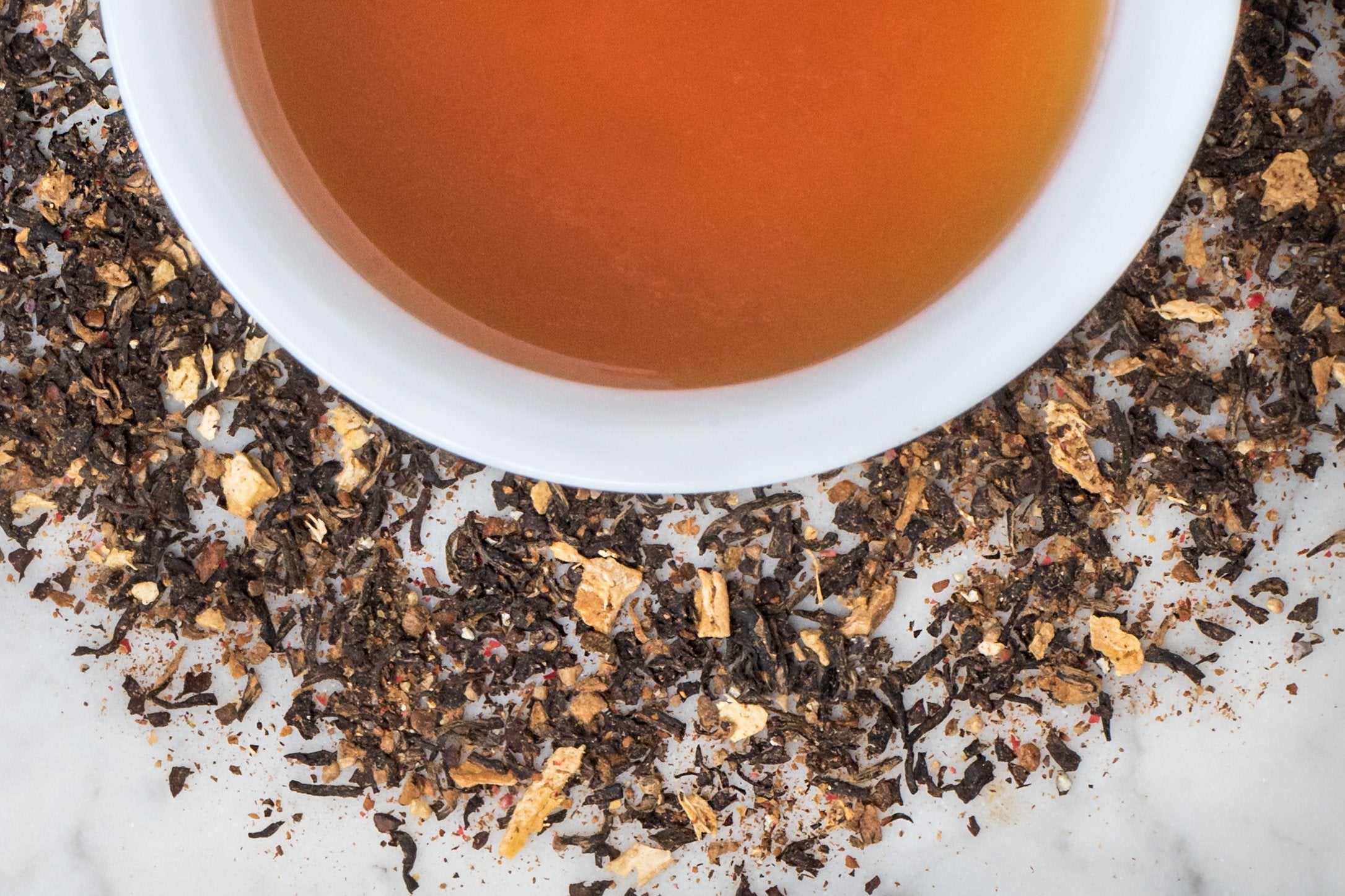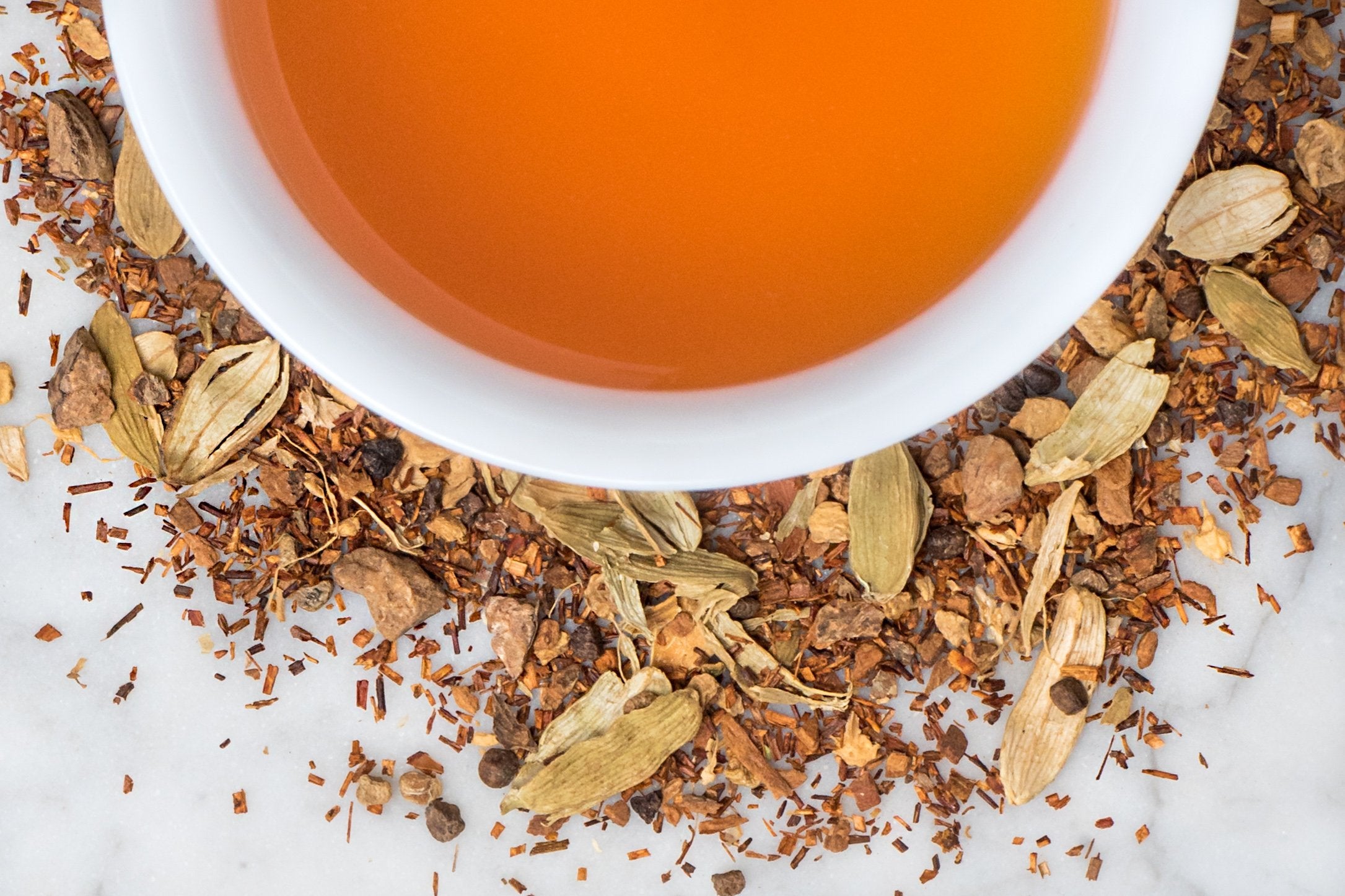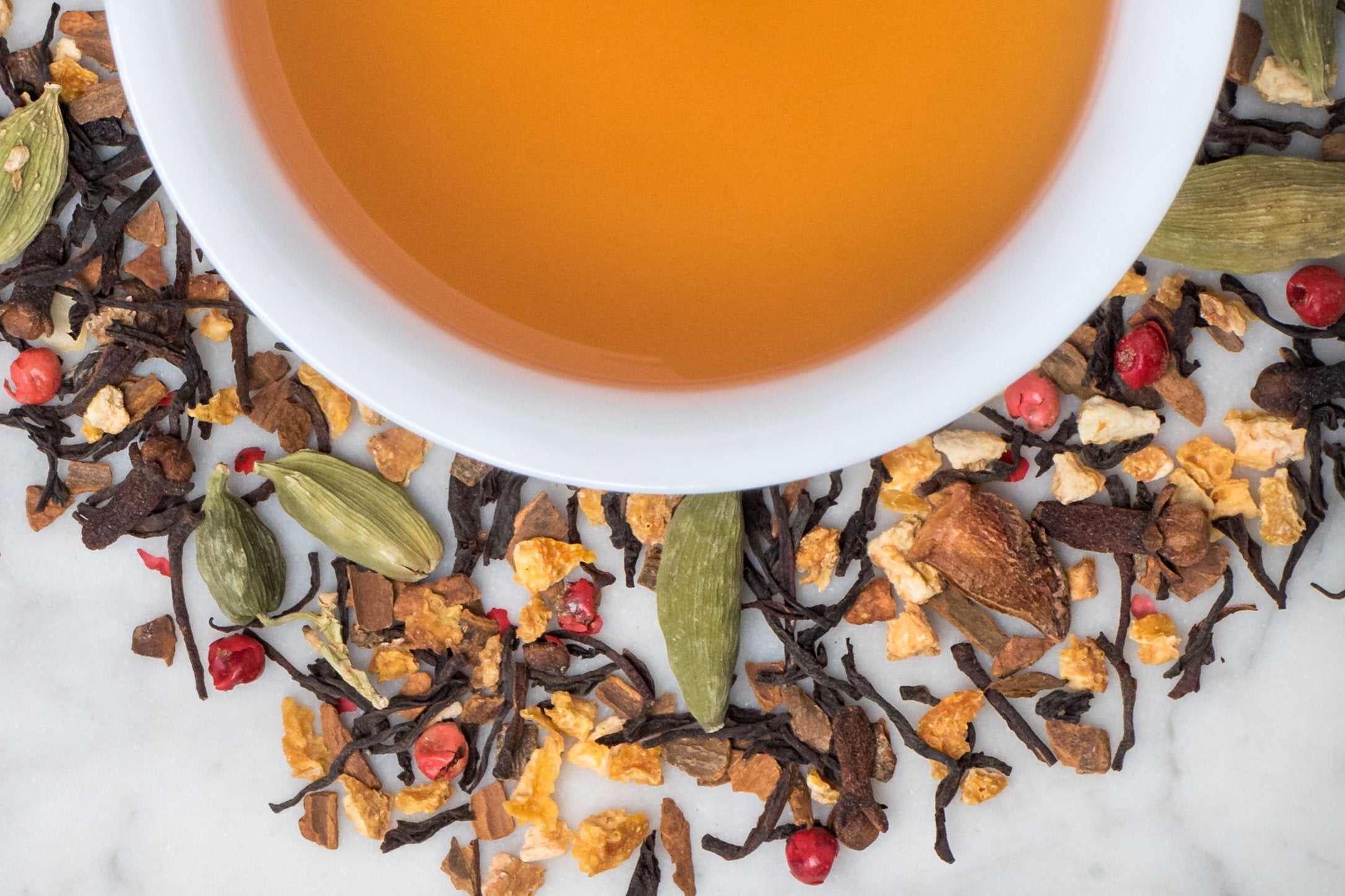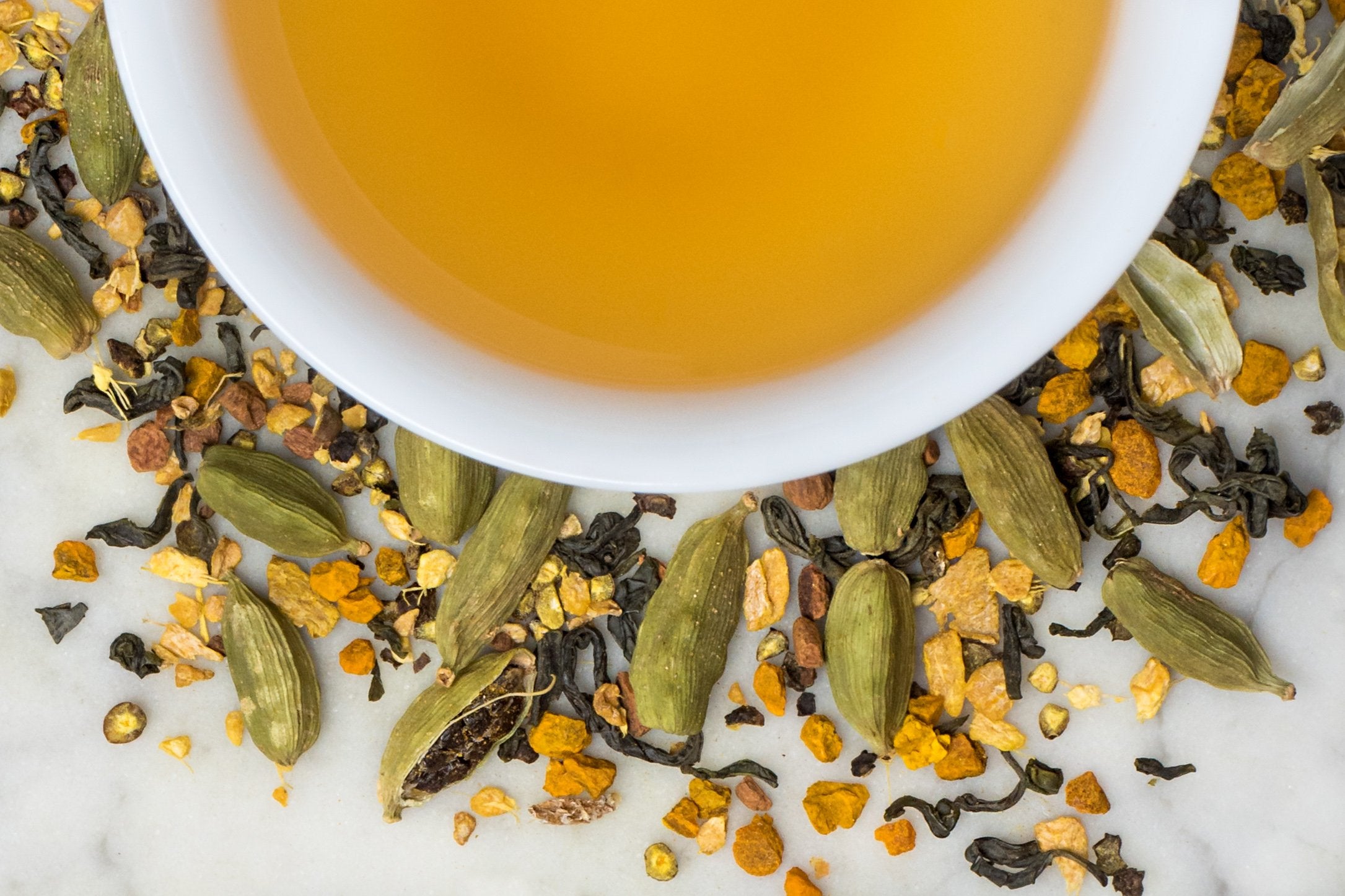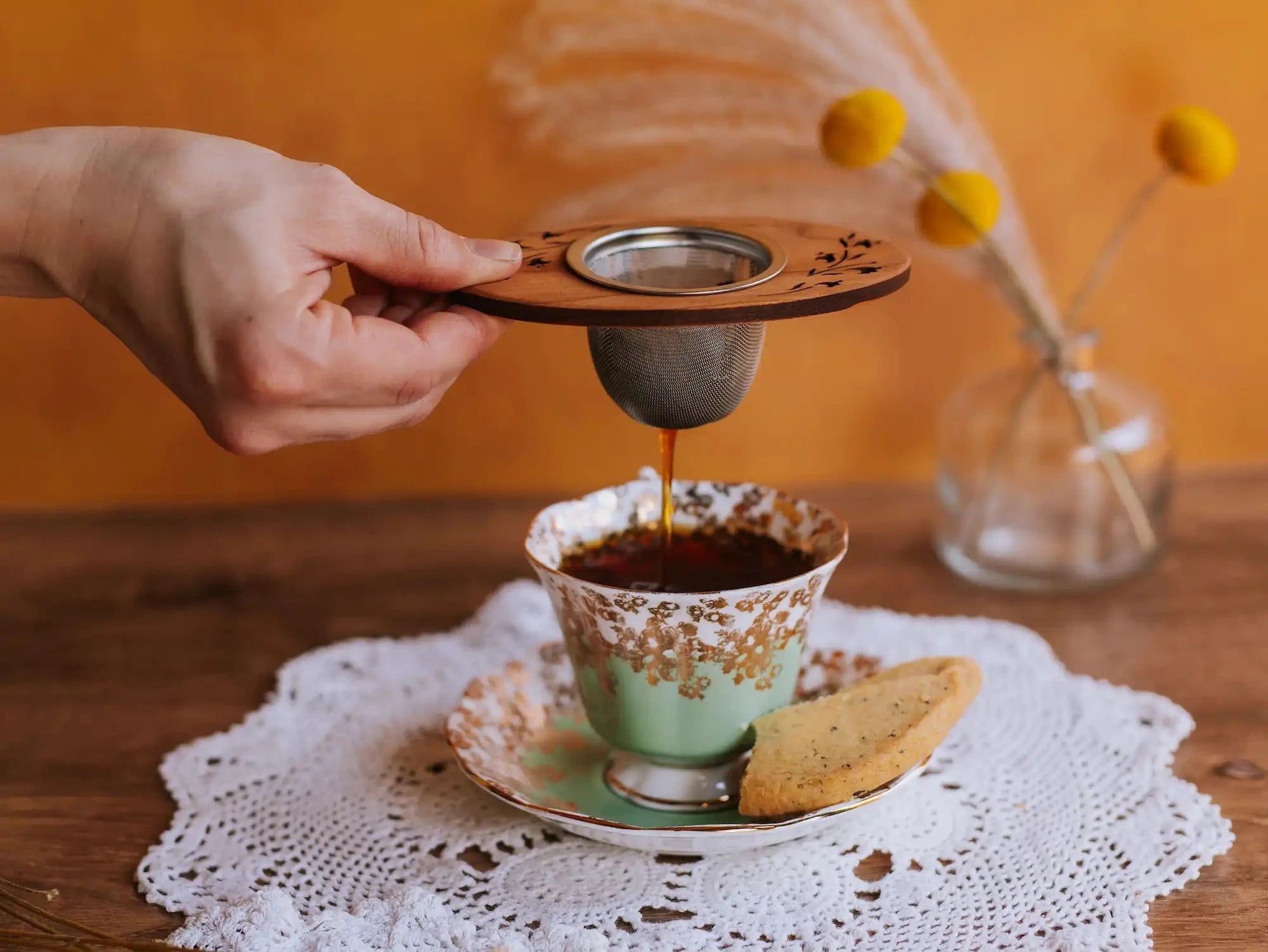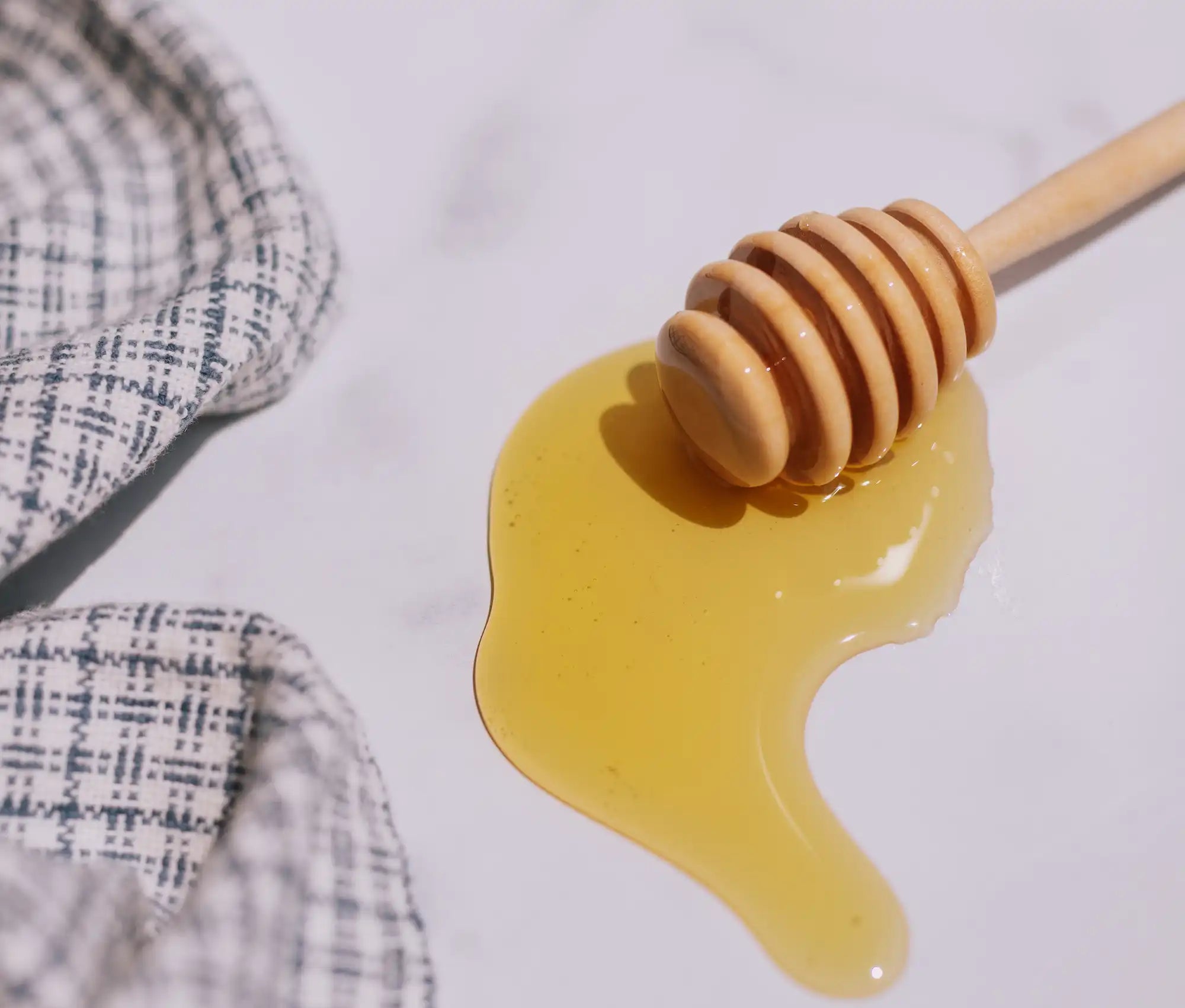How Much Caffeine is in Chai Tea?
Chai lattes are a perennial favorite at our Tea Bar, served hot for a cozy pick-me-up during the winter months or iced for a refreshing summertime treat. Recently we've found ourselves wondering - what is the actual caffeine content of traditional Masala Chai (spiced black tea), and how does the caffeine in chai compare to coffee or other teas?
Does Chai Tea have Caffeine?
To answer this frequently asked question in a nutshell: yes, traditional black tea chai contains caffeine. (Which is why we've created a spicy herbal chai with a rooibos base for chai lovers who want to enjoy a cup of sweet and spicy deliciousness without the added kick of caffeine.)
But first, let's back up a step and talk about what chai is, exactly, and why there's some confusion about its caffeine content.
A cup of "tea tea," anyone?
What is Chai Tea?
Masala Chai literally translates to "Spiced Tea," with "Chai" as the word for tea and "Masala" referring to any number of traditional Indian spice mixes that generally contain spices like cinnamon, ginger, cardamom, black pepper, and other similar spices (depending on personal taste and family recipe, your masala might also contain cloves, star anise, cumin, coriander, or even mace!). Masala Chai is a combination of this Masala spice mix and Indian black tea, traditionally Assam, though some recipes use Ceylon Orange Pekoe instead.
Referring to Masala Chai as chai tea (or "tea tea") is a redundant habit that Western tea drinkers have developed due a lot of complicated linguistic and political history. But the gist is that somewhere along the line in late-colonial and post-colonial India, the word "chai" became synonymous for English-speakers with spiced black tea served sweet with warmed milk, instead of the entire phrase: "Masala Chai". Decades later, Merriam-Webster has officially defined chai in the English language as "a beverage that is a blend of black tea, honey, spices, and milk." In an effort to avoid confusion and appease the search engines, we will use it that way.
Chai Gift Set
Would foamed milk by any other name taste as sweet?
What is a Chai Latte?
The next source of confusion for many people is the word latte in Chai Latte. In Italian, latte is simply the word for milk. English-speakers, however, have started to associate the word latte with espresso drinks. Often these drinks are ordered dropping the caffe from the original Caffe Latte. It is now very common for someone in the US to ask their local barista for a small latte with skim milk, for example, and as long as you're not in Italy - or faced with a particularly pedantic barista - this probably works just fine! But using latte in this way has lead to some confusion when it comes to other drinks with milk.
Unlike the simple redundancy of chai tea, using latte in this way has lead to some confusion when other drinks with foamed milk are ordered - like a Chai Latte or a Matcha Latte. Both Chai Lattes and Matcha Lattes are teas served with foamed milk and nary a drop of espresso to be found (unless you order your chai dirty...). As you can imagine, this has lead to many questions about whether or not there is coffee in Chai Lattes. The simple answer is: not unless you put it there!
So, long story short: we are going to continue to use chai to refer to spiced tea, but use the original definition of latte to indicate a drink made with milk, not a specific type of espresso drink.
To differentiate between our traditional Indian spiced chai teas and Westernized versions when you're browsing our website or ordering at the Tea Bar, you can look to the first word in the name - our Masala Chai is our traditional offering, while Golden Dragon Chai, Pumpkin Pie Spice Chai, and Saratoga Red Chai are spiced teas.
A Little About the Health Benefits of Caffeine
Caffeine in Tea
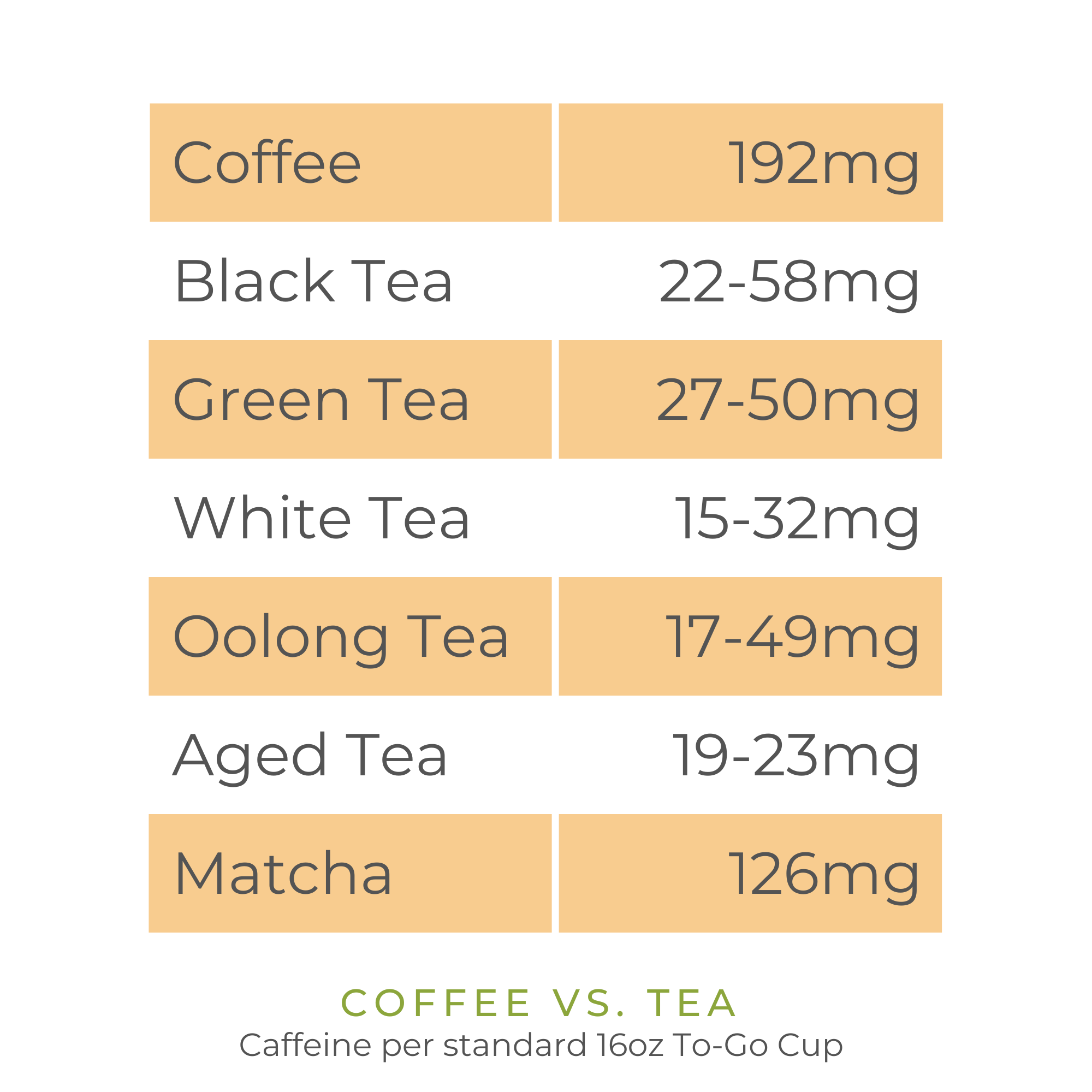
How much caffeine is in tea?
All traditional teas have caffeine, so any chai made with a black, green, or oolong tea base will contain some amount of caffeine. The caffeine content of your cup of tea will vary depending on the ratio of tea to water, steep time, and proportions of tea to scents (like the spices in Masala Chai). The chart below is a good place to start with understanding how much caffeine is likely in your cup of traditional tea, with the ranges given for each type of tea being a typical though by no means exhaustive representation of that type of tea.
*Caffeine Content range based on liquid chromatography-UV of teas infused in a teapot with 2 cups water; matcha was whisked in a bowl with 1/2 cup of water.
Before we delve further into the complicated sorcery of divining how much caffeine is in your chai latte, we want to take a moment to talk about caffeine in tea and how its affects may differ from the caffeine you're used to experiencing from coffee.
While the caffeine in tea is the same compound found in coffee, caffeine in tea bonds differently with other substances than the caffeine in coffee. Specifically, the caffeine bonds with the tannins in tea, and the tannins then prevent the caffeine from being released rapidly into the body. This is why tea produces a longer and more stable caffeination than coffee.
Another difference between the two types of caffeination is how the caffeine in tea affects and interacts with the central nervous system and cardiovascular system. Unlike the direct effect that caffeine in coffee has on the blood circulation and therefore heart rate, the caffeine in tea instead enlarges the diameter of the vessels in the cerebral cortex. In other words, the caffeine in tea is more of a stimulant than an excitant, sharpening the mind and decreasing fatigue (according to Tea: History, Terroirs, Varieties; Second Edition).
What Affects Caffeine Levels in Tea
Caffeine in Chai & Chai Lattes
You probably noticed we did not include Masala Chai in the above chart about caffeine in tea. Mostly, that's because we do not want to be reductive, so we are giving it its own chart below.
The caffeine content of your chai is going to depend on a lot of factors:
- What is the ratio of tea to spices in your chai recipe?
- Are you drinking your chai as a regular infusion of 5-8g in about 16oz of water?
- Is your chai a concentrate that was steeped for a long period of time and then reduced?
Assuming that your chai is about a half/half ratio of tea to spices, we can infer that a regular infusion of chai would have about half the caffeine of a regular black tea, or 11-24mg. However, there's one big factor that we haven't addressed yet: the length of your infusion will change the amount of caffeine in your tea.
Studies show that while the majority of caffeine in tea is released in the first 3 minutes of steeping, caffeine is still released after those initial minutes with the curve beginning to level out around 10 minutes. In an infusion of the same Huiming green tea, a 4.5 minute steep in 1 cup of water released 13mg of caffeine while a 10 minute steep released 21mg. Comparing that to our 16oz to-go cups in the chart above, the 4.5 minute steep would contain about 26mg while the 10 minute steep would contain about 42mg, not quite double the caffeine in a little over double the time! Because of this, the caffeine content of a chai concentrate like the one we use at our Tea Bar for chai lattes is going to be higher than a regular cup of chai at a one-to-one ratio.
But things are about to get complicated again because chai concentrate is generally served with milk to make what we call a chai latte, while a regular infusion of chai would be drunk black or slightly sweetened... so we can't do a simple one-to-one comparison.
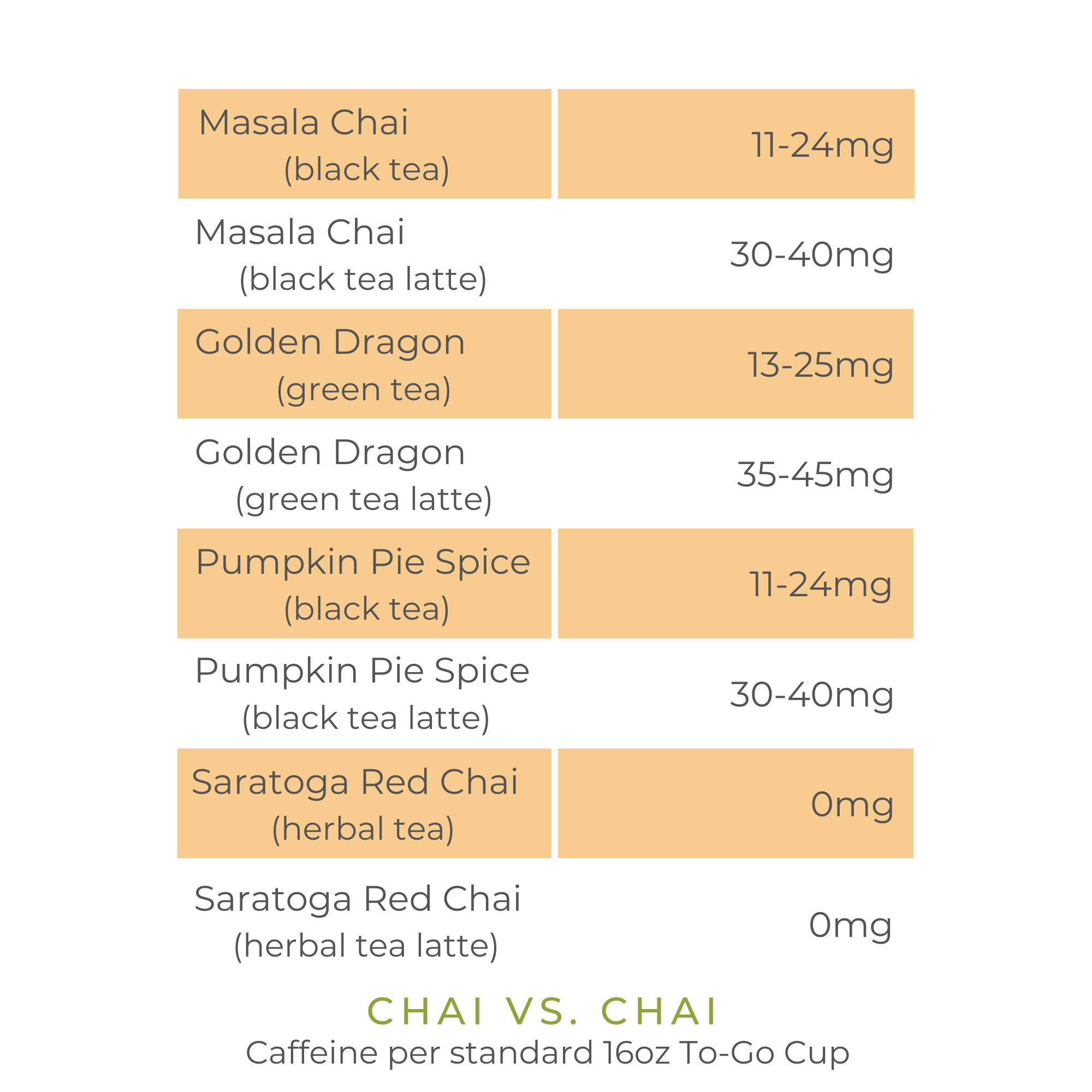
A breakdown of caffeine in chai and chai lattes
Ready to tear your hair out yet? (If so, the main takeaway here is that Masala Chai tea has caffeine, and if you want a caffeine-free substitute we recommend Saratoga Red Chai!)
Still, we will do our best to break down for you the ranges of caffeine in chai based on how you are consuming the beverage in this chart!
*Approximate caffeine levels based on standard latte concentrates and proportions; caffeine levels will vary based on steep time and ratio of concentrate to milk.
Shop Chai
From $ 3.00
From $ 4.00
From $ 3.65
From $ 3.80
Resources:
Gascoyne, K., Marchand, F., & Desharnais, J. (2013). Tea: History, Terroirs, Varieties (Second ed.). Firefly Books.
USDA. (n.d.). FoodData Central - Tea, hot, chai, with milk. FoodData Central. Retrieved February 25, 2021, from https://fdc.nal.usda.gov/fdc-app.html#/food-details/1104278/nutrients

